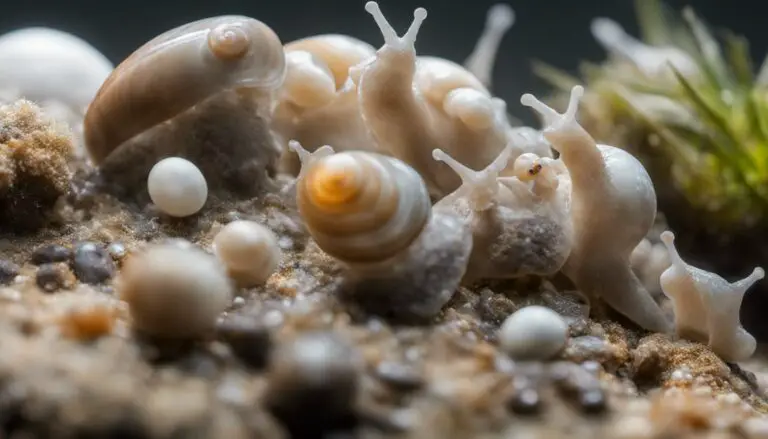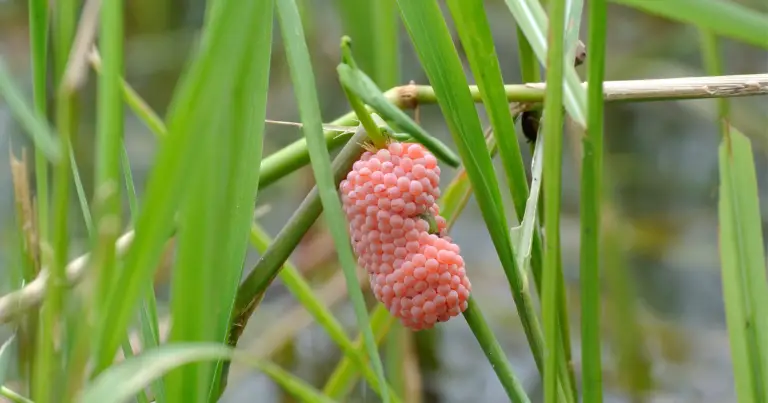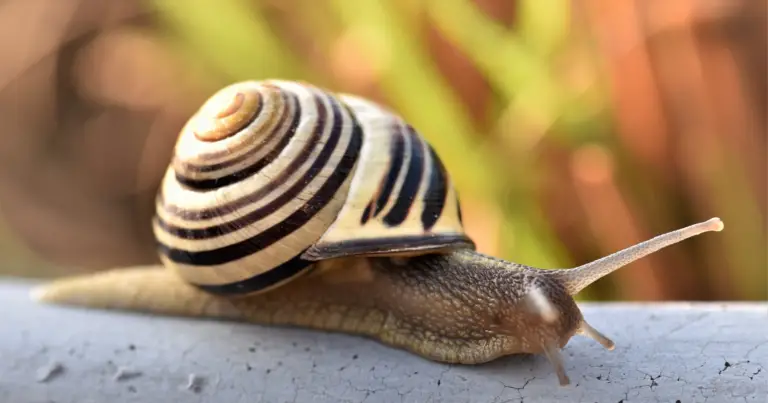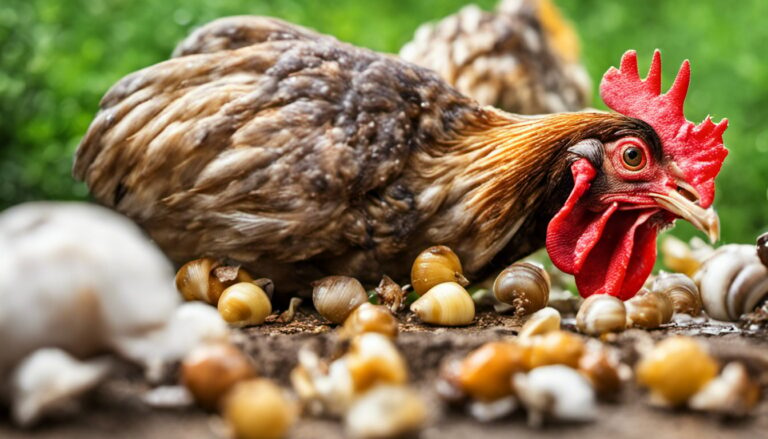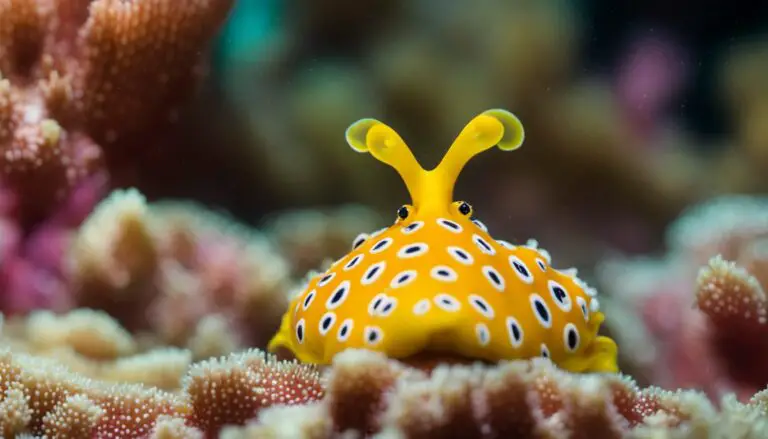Do Turtles Eat Snails?
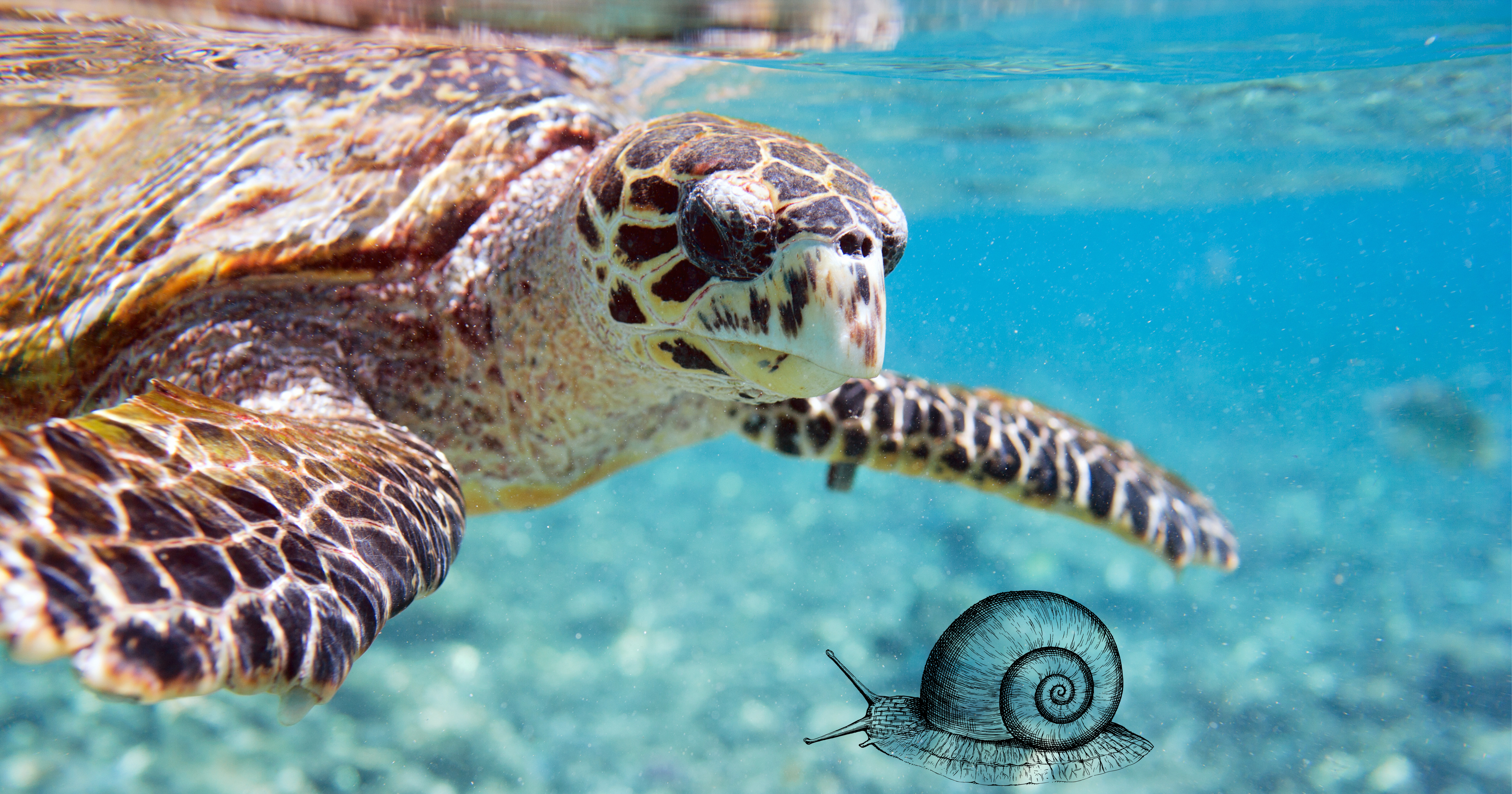
Turtles are fascinating creatures with unique eating habits. You might be curious to know, “Do Turtles Eat Snails?” Understanding their dietary preferences can help you learn more about their behavior and ensure their well-being through a proper diet if you’re a turtle owner.
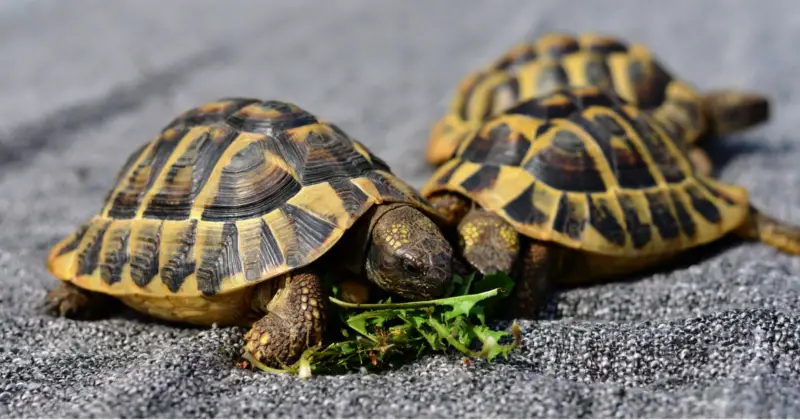
Turtles feast on various creatures in the wild, including worms, slugs, and snails. Turtles need protein to stay healthy, and snails can provide that essential nutrient. However, it’s important to note that some snails can host harmful parasites, and feeding wild snails to your pet turtle is not recommended.
As you delve deeper into the topic of turtles and snails, you’ll uncover more interesting facts about their dietary preferences, the wild environment, and the precautions to take when caring for these captivating reptiles.
Contents
Table of Contents
Overview of Turtles’ Diet
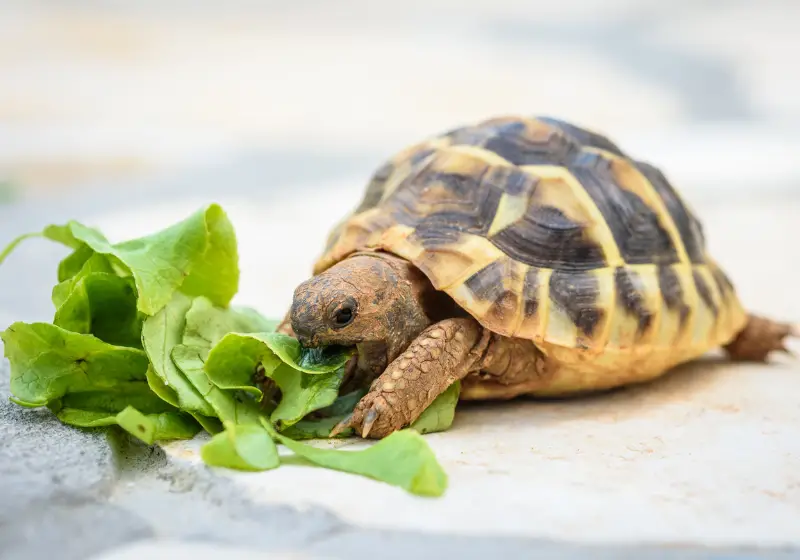
Turtles are fascinating creatures with diverse diets, depending on their species and natural habitats. As a turtle owner or enthusiast, understanding their nutritional requirements is essential for maintaining their health and well-being.
In general, turtles’ diets consist of both plant and animal-based foods. They consume various items, ranging from insects, worms, snails, and small fish to grasses, fruits, and vegetables. Balancing their protein, vitamin, and mineral intake is crucial to prevent health problems and promote proper growth.
Aquatic turtles primarily feed on items found in water, such as insects, mollusks, crustaceans, and small fish. They also enjoy aquatic plants and vegetables like lettuce, water hyacinth, and lily leaves. These turtles require a protein-rich diet, especially during their growth phase.
Terrestrial turtles, or tortoises, have a more herbivorous diet. They graze on grasses, flowers, leaves, and fruits. Some may occasionally eat insects and other invertebrates, but their diet predominantly consists of plants and vegetables.
Semi-aquatic turtles, also known as box turtles, consume a mix of plant-based and animal-based foods. They enjoy fruits, vegetables, worms, insects, snails, and mushrooms. Feeding these turtles a diverse diet helps them replicate their natural eating habits and ensures they receive the necessary nutrients.
It’s important to remember that each turtle species has specific dietary needs. Regardless of whether you’re caring for an aquatic, terrestrial, or semi-aquatic turtle, researching and understanding their unique nutritional requirements will ensure you’re providing the best possible care.
Understanding the Eating Habits of Turtles
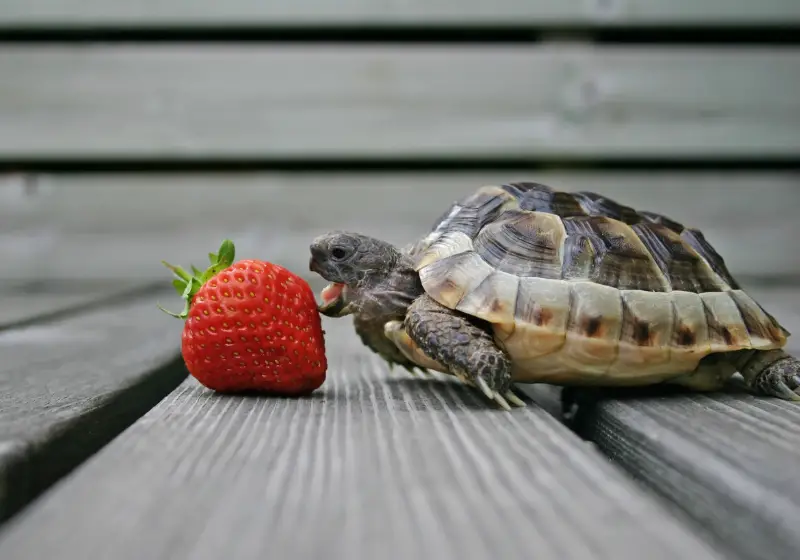
Regarding turtles’ eating habits can vary depending on their species, age, and whether they live in the wild or captive. Being confident and knowledgeable about their dietary needs is essential for maintaining their health and well-being.
Turtles often display omnivorous tendencies in the wild, consuming plant and animal matter. You may observe that they enjoy feasting on various foods, including snails, slugs, worms, and other insects. Snails are a natural part of their nourishment. However, it is essential to know that snails can contain harmful parasites, especially when sourced from the wild. For captive turtles, it is safer to provide them with live snails sourced from reliable places.
As turtles grow older, their dietary requirements change. Baby and juvenile turtles have different needs compared to adult turtles. Younger turtles generally require more protein for their growth and development, so offering them small to medium-sized snails can benefit their diet.
In contrast, adult turtles might have a more varied diet, including leafy greens, fruits, and flowers. Keep in mind that not all turtle species have the same dietary requirements. For example, red-eared slider turtles are known to consume earthworms, snails, slugs, and leafy greens, while land turtles might also eat beetles, fruit, and grass, according to the National.
When providing food for captive turtles, it’s essential to create a balanced diet that caters to the specific needs of the species you’re caring for. It is important not to overfeed them on any single food type, especially when it comes to food items like snails. This helps ensure your turtles receive the proper nutrients that promote their health and well-being.
Nutrition Requirements of Turtles
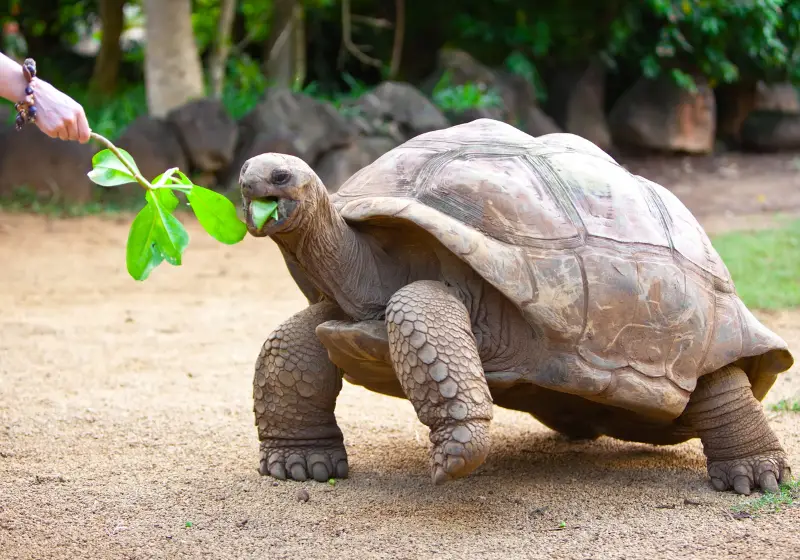
As a turtle owner, it’s essential to understand your pet’s nutritional needs to keep them healthy and thriving. The primary components of a turtle’s diet include protein, calcium, and other essential vitamins and minerals.
Feeding your turtle a well-balanced diet will help prevent common health issues such as pyramiding, where the turtle’s shell grows unevenly due to inadequate calcium intake. Calcium is vital for maintaining healthy shell and bone development. You can ensure a proper calcium intake by providing calcium-rich foods and a cuttlebone for your turtle to nibble on.
Protein is another crucial factor in a turtle’s diet, especially for growing juveniles. However, the protein content should be adjusted according to the age and species of the turtle to prevent obesity and other health problems.
Other essential nutrients besides calcium and protein include potassium, iron, and vitamin A. Potassium helps support your turtle’s overall growth and development. Foods high in potassium, like dark leafy greens and fruits, should be incorporated into their diet.
Iron plays a significant role in supporting your turtle’s blood health and immune system. Foods rich in iron include red meat, liver, and spinach. Ensure that these are included in your pet’s diet in moderation and according to their dietary preferences.
Vitamin A is vital for maintaining healthy skin, eyes, and respiratory systems in turtles. Lack of vitamin A can lead to vitamin A deficiency, causing various health complications. Include foods like carrots, mustard greens, and sweet potatoes to ensure adequate vitamin A intake.
Remember that while turtles can eat snails, it’s important to source them from reliable places to avoid potential parasites that can harm your pet.
In summary, understanding and meeting the nutritional needs of your turtle is crucial in maintaining their overall health and longevity. A balanced diet with adequate calcium, protein, potassium, iron, and vitamin A will support their growth and development.
The Role of Snails in a Turtle’s Diet
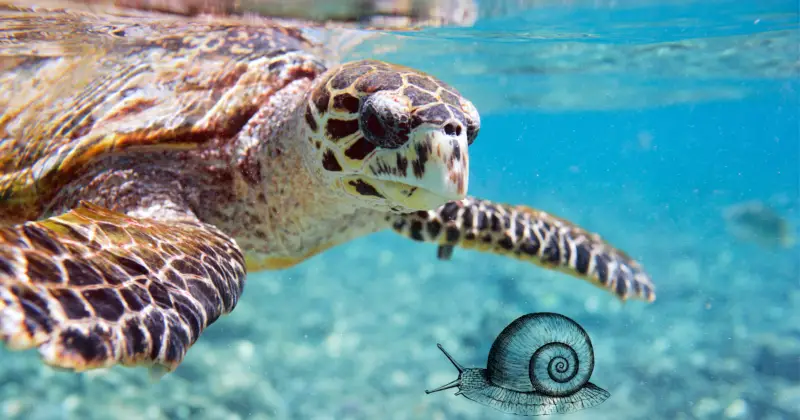
Snails play an important role in a turtle’s natural diet. Turtles often eat snails in the wild, as they are a good source of protein. However, it’s important to note that snails can sometimes contain harmful parasites, so if you’re considering feeding snails to your pet turtle, it’s essential to source them from reputable suppliers.
Regarding your pet turtle’s diet, live food, including snails, can be an excellent source of nutrition. In addition to snails, freshwater turtles may consume worms, insect larvae, aquatic insects, crustaceans, water plants, algae, and fallen fruit. That said, be mindful of the shell size when offering snails to your pet turtle, especially for baby and juvenile turtles, as they may have difficulty eating larger shells.
Snails can be a part of your pet turtle’s healthy diet, but it’s important to monitor the frequency with which you provide them snails. A balanced diet is necessary for the well-being of your turtle. Giving turtles two snails every ten days is recommended to maintain their health. Providing too many snails can lead to pyramiding, a condition characterized by the abnormal growth of a turtle’s shell.
Some recommended snail types for turtles include ramshorns, apple snails, pond snails, and mystery snails. However, snails can carry parasites like flukes, which could harm your turtle if ingested. Always acquire snails from trusted sources to minimize the risk of parasite transmission.
In summary, snails can be a nutritional and natural part of your turtle’s diet. Be cautious about the size and sourcing of the snails, and provide them in moderation to maintain your turtle’s overall health and well-being.
Different Types of Snails Turtles Eat
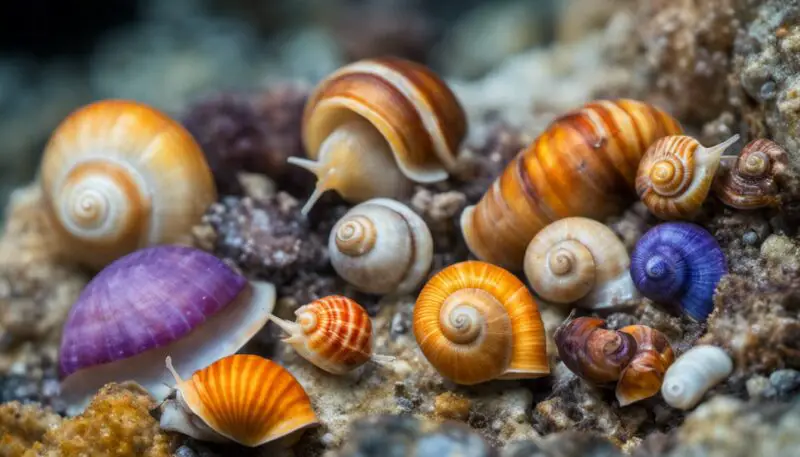
When considering the diet of your pet turtle, it’s important to know about the various types of snails they may enjoy eating. Some popular snail varieties for turtles include common, mystery, apple, and pond snails. These snails can be a healthy source of protein and other essential nutrients for your turtle.
Common and garden snails can be found in the wild or purchased from reliable suppliers. These snails have a unique spiral shell and are often found in gardens, parks, and other outdoor environments. They can be valuable to your turtle’s diet if sourced from trusted places to reduce the risk of parasite transmission.
Mystery and apple snails are popular aquatic snails typically found in freshwater aquariums. They come in various colors and sizes, making them an appealing choice for turtle keepers. These snails offer similar nutritional benefits to common snails and can be a part of a balanced turtle diet when fed in moderation.
Pond and water snails are smaller varieties of aquatic snails that are easy for most turtles to consume. They are found in ponds and water habitats and are known to be a natural part of the diet of many wild turtles. Just like other snails, ensure that you source them from reputable suppliers to minimize the risk of parasites.
In addition to live snails, there are also canned snails that can be fed to turtles. Canned snails are pre-cooked and parasite-free, making them a safe option for your turtle. However, they may lack some nutrients compared to live snails, so ensuring your turtle gets a balanced diet with a mix of fresh and canned food options is essential.
In conclusion, a variety of snails like common, mystery, apple, and pond snails can be included in your turtle’s diet. Whether you opt for live, garden, or canned snails, always ensure you’re sourcing them from reliable suppliers to keep your turtle healthy and parasite-free.
Risks Associated with Turtles Eating Snails
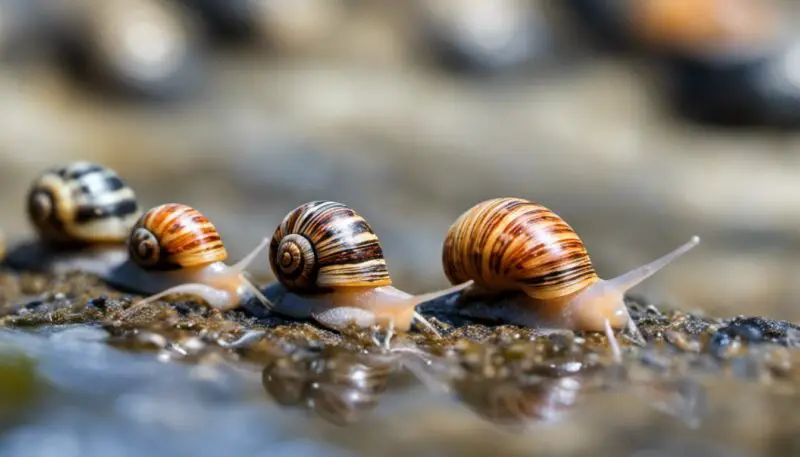
You should be aware of several risks associated with turtles eating snails. One of the primary concerns is the potential presence of harmful parasites in the snails. Wild snails can sometimes host parasites, such as lung flukes, that can be fatal to turtles if ingested. To minimize the risk of parasite transmission, it is recommended that you choose snails for your turtle’s diet from reputable and traceable sources.
In addition to parasites, snails can also carry harmful chemicals that might negatively impact your turtle’s health. These chemicals can originate from the snails’ environment, such as polluted waters or pesticide-contaminated plants. Ingesting snails exposed to these harmful substances can potentially lead to health risks for your turtle.
Infections are another concern when it comes to feeding snails to turtles. Although snails can be a natural part of a turtle’s diet, improper handling or preparation can lead to bacterial or viral infections in your pet. To reduce the risk of infection, ensure that you properly prepare the snails and maintain a clean environment for the snails and your turtle.
In conclusion, while turtles can consume snails, it is important to be cautious and take necessary measures to avoid potential health risks. By sourcing snails from reliable places, properly preparing them, and maintaining a clean environment, you can help keep your turtle healthy and safe from harmful parasites, infections, and chemicals.
Feeding Recommendations for Turtles

A balanced and diverse diet is essential when providing food for your turtles. Snails can be a part of their diet, but it’s crucial to maintain moderation in feeding snails to turtles like painted turtles, musk turtles, snapping turtles, loggerhead turtles, and box turtles.
Painted turtles are known to eat snails in the wild, so including them in a captive diet is an excellent way to provide necessary nutrients. Similarly, musk turtles also enjoy eating snails. They can benefit from their protein content, but make sure to source live snails from reliable places since snails can sometimes contain harmful parasites.
Snapping and loggerhead turtles may also consume snails as a part of their natural diet, but these turtle species may require a higher consumption of fish and other aquatic prey. Researching their specific dietary needs before incorporating snails into their meals is important.
When adding snails to your turtles’ diet, consider the suitable types, such as ramshorns, apples, ponds, and mystery snails. Baby and juvenile turtles can safely eat small to medium-sized snails for protein, but be cautious of feeding them land snails or slugs, which can be harder to digest.
To maintain your turtles’ health, offering them a variety of food, including leafy greens, fruits, and other protein sources like insects and snails, is essential. Speak to a professional or a veterinarian specializing in reptile care if you are unsure about your turtle’s dietary requirements. By providing a balanced diet, you’ll ensure that your turtles remain healthy and thrive in their environment.
FEEDING TURTLE LIVE FOOD | Snails, Fish, Shrimp
Alternatives to Snails in a Turtle’s Diet
As a turtle owner, providing your pet with a diverse and well-balanced diet is essential. While snails can be a part of their diet, it’s important to explore other food options that provide necessary nutrients for the turtle’s overall health. Here are some alternatives to snails that you can consider for your turtle’s diet.
Fish are a good source of protein for your turtle. Small fish such as minnows, guppies, or goldfish can be an excellent addition to your turtle’s diet, ensuring they receive the vital nutrients they need to grow and thrive. Choosing live, fresh fish is desirable as they offer the most nutritional value.
Incorporating worms and insects into your turtle’s diet can also be beneficial. Earthworms, grubs, and caterpillars provide a great source of protein, and beetles can also be an excellent option. These can be easily found at your local pet store or backyard.
Regarding plant-based foods, fruits, flowers, and algae suit your turtle. Watermelon, apples, and strawberries are popular fruit choices that supply valuable vitamins. Edible flowers such as dandelions, hibiscus, and roses can also be included to offer some variety.
Adding shrimp to your turtle’s diet can be another suitable option. Both fresh and frozen shrimp provide a healthy amount of protein, enriching the turtle’s diet and supporting growth. Be sure to remove the shrimp shells, as they can be difficult for the turtle to digest.
Lastly, don’t forget to include aquatic plants such as water lettuce, duckweed, and water hyacinth, which contribute to overall dietary balance. These plants provide essential nutrients and create a more natural and comfortable environment for your turtle.
Introducing diverse food items such as fish, worms, insects, and plant-based options will help maintain your turtle’s health, ensuring they receive the essential nutrients they need for a happy and long life.
FAQs: Do Turtles Eat Snails
Do box turtles consume snails?
Yes, box turtles can eat snails as part of their diet. Snails are a natural source of nutrition for them, providing protein and calcium. However, it is important to ensure that the snails are sourced from reliable places to avoid harmful parasites.
Can aquatic turtles eat shrimp?
Aquatic turtles can indeed eat shrimp, which can be a good source of protein for them. It is recommended to provide them with de-shelled and deveined shrimp, either fresh, frozen or dried, as a part of their balanced diet. Additionally, make sure the shrimp size is appropriate for your turtle.
Is it safe for turtles to eat mystery snails?
Turtles can safely eat mystery snails as part of their diet, as these snails provide protein and calcium. Like other snails, ensure the mystery snails are sourced from a reliable place to prevent parasite transmission.
Do turtles have a diet that includes snakes?
While some turtles can be opportunistic predators, their diet rarely includes snakes. Turtles primarily consume invertebrates, like insects and snails, as well as small fish and plant matter. It is unlikely for turtles to prey on snakes in the wild or captivity.
What organisms can coexist with turtles in a tank?
Several organisms, such as non-aggressive fish, snails, and aquatic plants, can coexist with turtles in a tank. It is essential to research the compatibility of the tankmates with your specific turtle species and provide enough space and resources for all the inhabitants.
Can turtles eat slugs as part of their diet?
Turtles can consume slugs as a part of their diet, as they are similar to snails in terms of nutrition. However, just like with snails, it is crucial to ensure the slugs are sourced from a reliable place to avoid potential risks of parasite infections.

![Do Snails Eat Grass? [Complete Answer]](https://allourcreatures.com/wp-content/uploads/2021/10/snails-eat-grass-768x519.jpg)
